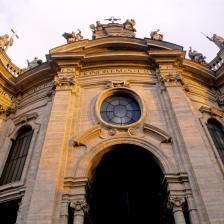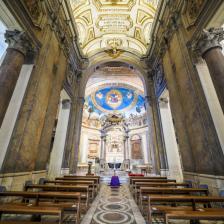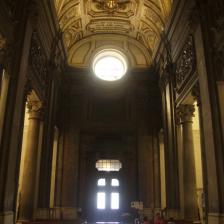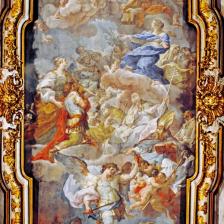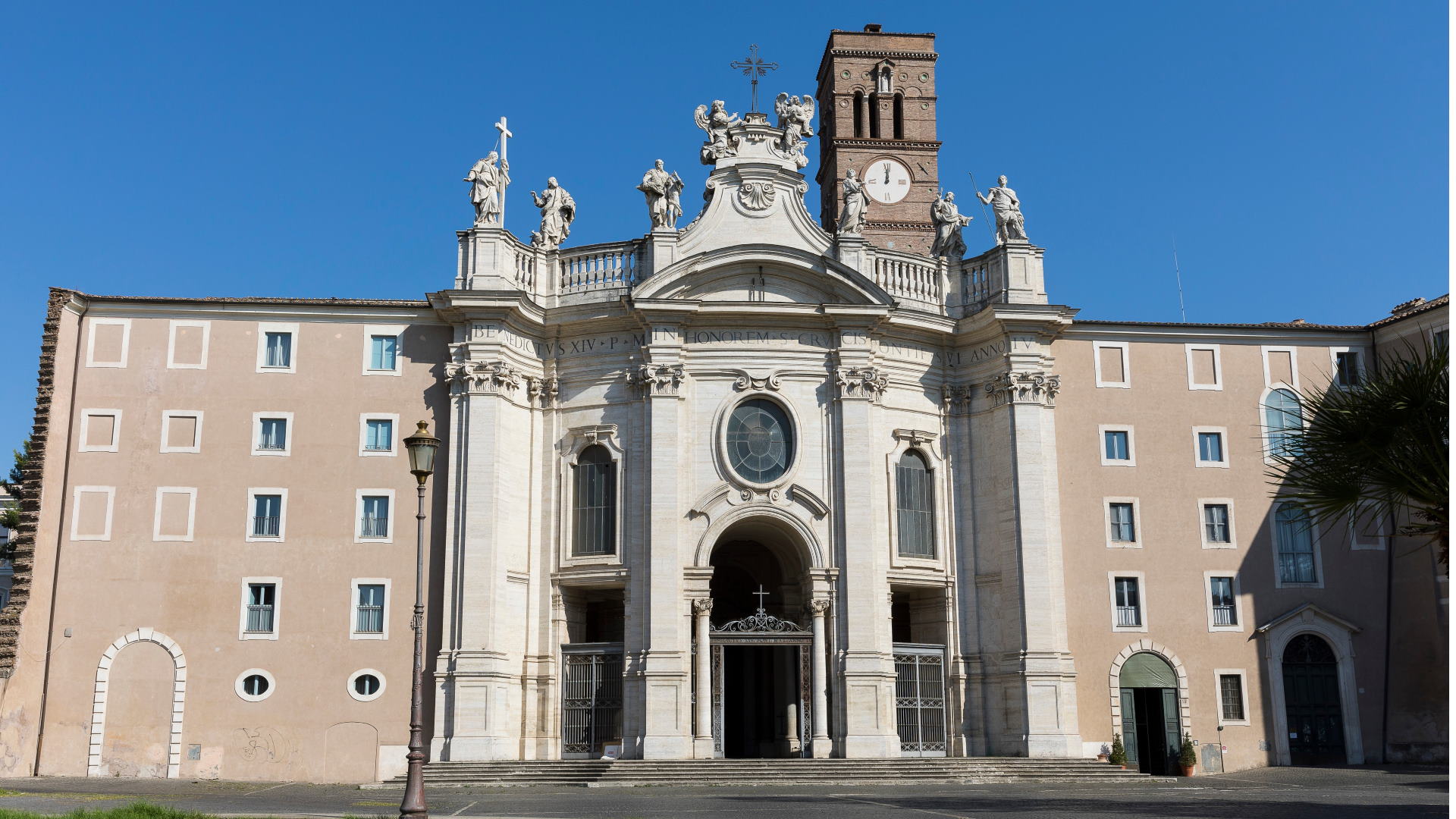
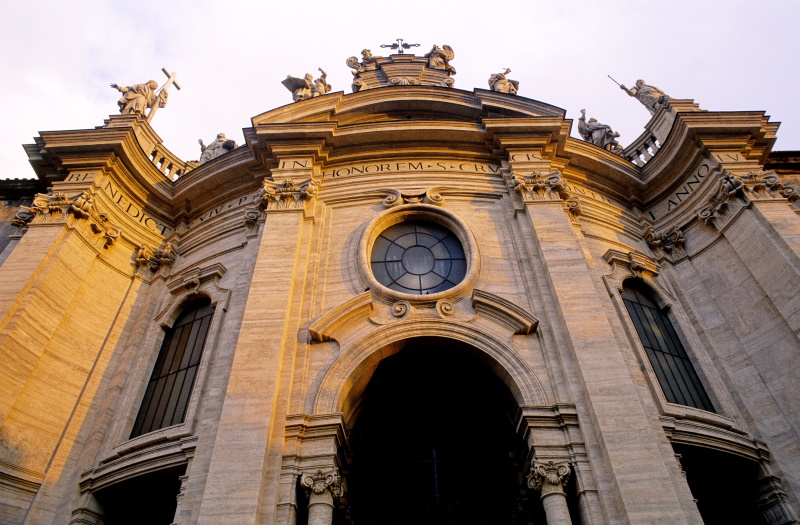
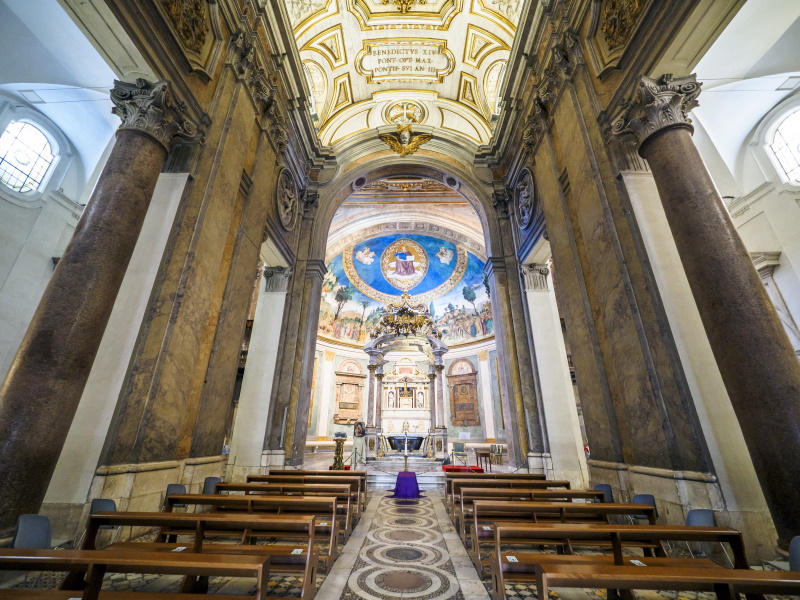
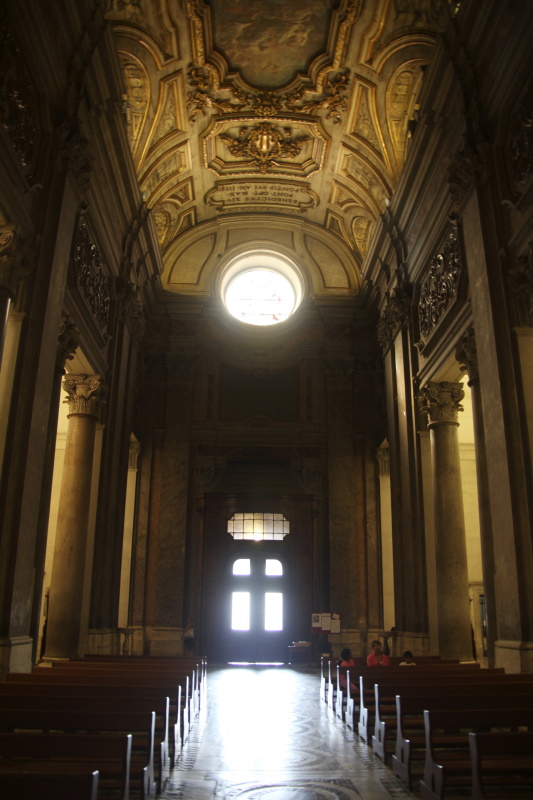
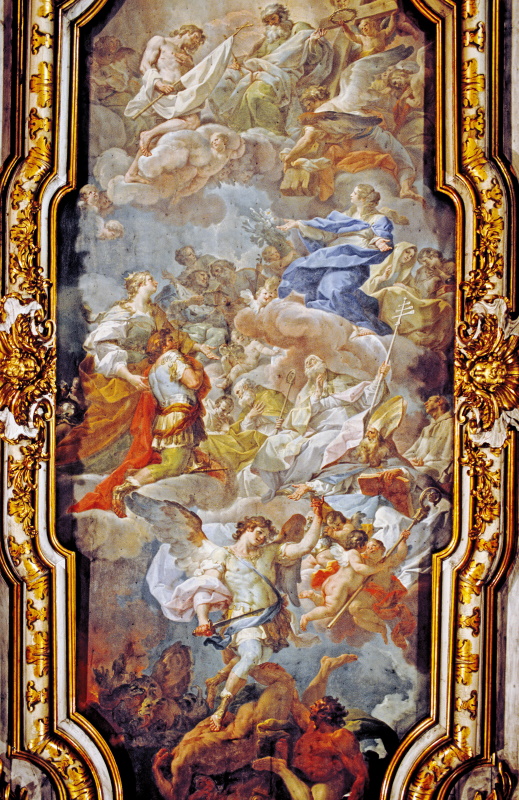
Die Kirche Santa Croce in Gerusalemme gehört zur Pilgerreise zu den Sieben Kirchen, die im 16. Jahrhundert vom Heiligen Philipp Neri ins Leben gerufen wurde. Die Kirche steht auf den Überresten des Sessoriums, einer kaiserlichen Palastanlage, die in der ersten Hälfte des 3. Jahrhunderts n. Chr. errichtet wurde und zu der auch der Circus Varianus und das Amphitheatrum Castrense gehörten. Zu Beginn des 4. Jahrhunderts wurde der Komplex von Helena, der Mutter von Kaiser Konstantin dem Großen, als Wohnsitz gewählt. Sie ließ das große Atrium in eine Kapelle umwandeln, um dort die Kreuzreliquien aufzubewahren, die sie nach Rom gebracht hatte. Um die Kapelle herum wurde die Basilika gebaut, weshalb sie auch „Eleniana“ oder „Sessoriana“ genannt wird.
Die Basilika wurde 1144 von Papst Lucius II. grundlegend erneuert, der auch einen Säulengang hinzufügte und den schönen Glockenturm aus Backstein errichtete, der heute noch steht. Ihr heutiges Aussehen verdankt sie jedoch größtenteils den Arbeiten, die Benedikt XIV. im 18. Jahrhundert bei Pietro Passalacqua und Domenico Gregorini in Auftrag gab. Die von ihnen entworfene Fassade ist eines der Meisterwerke des „römischen Barocchetto“ mit eindeutig borrominischen Wurzeln.
Der Innenraum ist durch zwölf kolossale antike Granitsäulen in drei Schiffe unterteilt, von denen vier bei der Renovierung im 18. Jahrhundert in Pfeiler umgewandelt wurden. Die Halbkuppel der Apsis ist mit Gemälden geschmückt, die Antoniazzo Romano zugeschrieben werden. In der Mitte der Apsis befindet sich das herrliche Grabmal des Kardinals Francesco Quiñones, das von Jacopo Sansovino geschaffen wurde. Die Kapelle der Heiligen Helena am Ende des rechten Seitenschiffs ist mit einem Mosaik geschmückt, das im 16. Jahrhundert von Melozzo da Forli oder Baldassarre Peruzzi nach einem Original aus der Zeit Valentinians III. neu angefertigt wurde. Unter dem Fußboden soll die Erde vom Kalvarienberg aufbewahrt werden, die von Helena nach Rom gebracht wurde, zusammen mit den heiligen Reliquien, die in der nahe gelegenen Reliquienkapelle aufbewahrt werden. Die Statue auf dem Altar ist ein römisches Original, das in Ostia gefunden und durch Hinzufügung des Kreuzes und Ersetzen des Kopfes in die Heilige Helena verwandelt wurde.
In einem an die Reliquienkapelle angrenzenden Raum befinden sich eine lebensgroße Kopie des Grabtuchs (ein Geschenk der Diözesankommission für das Grabtuch der Erzdiözese Turin an die Basilika im Jahr 2003) und das Grabtuchkruzifix von Monsignore Giulio Ricci, nach dem das hier ansässige Diözesanzentrum für Sindonologie benannt ist. Am Fuße der Kapelle ruhen seit 1999 auch die sterblichen Überreste der Dienerin Gottes Antonietta Meo, genannt „Nennolina“ (1930-1937), eines kleinen Mädchens, das in den 30er Jahren nur wenige hundert Meter von der Basilika entfernt lebte und im Alter von sechseinhalb Jahren an einem Osteosarkom starb.
Im Bereich des Amphitheatrum Castrense, das jahrhundertelang zur Basilika und zum Kloster gehörte, wurde 2004 der Garten des Zisterzienserklosters nachgebildet: seine Tür aus Eisen und Glas ist ein Werk von Jannis Kounellis.
Informationen
WEEKDAY HOLY MASSES
Monday: 08.00, 18.30Tuesday: 08.00, 18.30Wednesday: 08.00, 18.30Thursday: 08.00, 18.30Friday: 08.00, 18.30Saturday and publicholidays: 18.30Sunday and public holidays: 8.00, 10.00, 11.30, 19.00
At the Crypt of the Basilica
CHAPEL OF RELICSThe Chapel of Relics is open every day during the opening hours of the Basilica. It is closed 15 minutes before weekday, prefestive and festive Masses when they are celebrated at the High Altar of the Basilica, and during the celebration of weddings or funerals.
Reception service in the BasilicaEvery day: from 10.00 to 12.00, in the afternoon from 16.30 to 18.30On all other days you can contact the Reception desk.
Museum of the BasilicaThe Museum of the Basilica has been reopened and can be visited. Access from the Sacristy every day at the following times: from 10.00 to 12.00 noon and in the afternoon from 16.30 to 18.30The times may be subject to change, so please always contact the Basilica
 Condividi
Condividi
Location
Um mehr über alle barrierefreien Dienste zu erfahren, besuchen Sie den Abschnitt barrierefreies Rom.













































